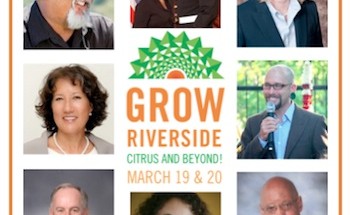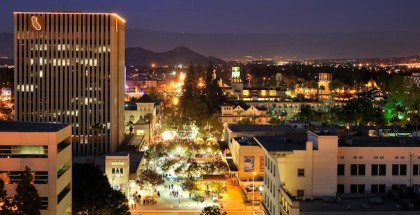sustainable agriculture news
Seedstock’s “Grow Riverside” Sustainable Agriculture Conference Enhances Event with Nationally Known Experts
February 26, 2014 | seedstockRIVERSIDE, Calif. — Spearheading the movement to assist cities develop more urban sustainable farming within their environs, the “Grow Riverside: Citrus and Beyond!” conference continues to expand its stellar program lineup with notable authorities in resource management, agricultural growth strategies and public policy. The March 19-20 event presented by Seedstock in partnership with the City and Community of Riverside will be held at the Riverside Convention Center.
Appearing as opening night keynote is Richard Conlin, who created Seattle’s local food initiative while serving as a City Councilmember. Conlin will talk about how to develop and establish urban sustainable agricultural policies – from land-use to funding efforts.
“Local food policy is a key element in creating environmental sustainability, economic prosperity and improved public health,” Conlin said. “I hope my experience can help provide guidance on how to put this into practice.”
Conlin’s “Citrus Circle Dinner” presentation will culminate the farm-to-fork dining event sponsored by The Salted Pig, Downtown Riverside’s gastro pub noted for incorporating local citrus into both its cocktail and culinary creations.
Conference participants also will garner insight from several newly added speakers. Salted Pig owner and Riverside native, Ronaldo Fierro, will join Don Nishiguchi, regional local produce buyer for Whole Foods Market, Martin Anenberg, founder of So Cal Farm Network, and Gayle Shockey-Hoxter, Program Chief for the County of Riverside Department of Public Health, Nutrition & Health, in exploring the “Marketing Opportunity for Local Agriculture.” Leah Di Bernardo, executive chef for E.A.T. (Extraordinary Artisan Table), will assist in an examination of “The Value and Meaning of Local Agriculture.” Noah Fulmer, director of capacity building at Local Orbit and co-founder and former executive director of Farm Fresh Rhode Island, will collaborate on a review of “Local Ag Growth Strategies.” Mark Hoddle, director of the Center for Invasive Species at UC Riverside, along with fellow experts, will consider the economic viability of growing citrus in Riverside.
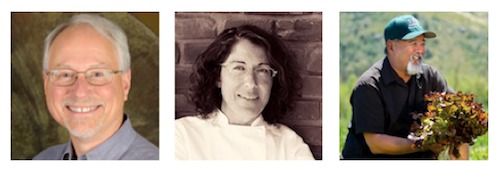
From left to right: Richard Conlin, former Seattle City Councilmember who established the city’s Local Food Action Initiative; Leah Di Bernardo, exec. chef at E.A.T. Extraordinary Artisan and Slow Food Movement proponent; and Don Nishiguchi, Regional local produce buyer for Whole Foods Market for the Southern Pacific region.
Rounding out the conference will be several pragmatic offerings, including: “Resources and Responsibility” – how a city’s land, water, energy and community resources can be sustainably managed and leveraged to create a successful local agriculture economy; as well as, “From Start to Finish: Setting up an economically viable operation on a 1 – 2 acre plot.”
Organized for the city of Riverside by Seedstock co-founder Robert Puro, the conference has been formulated as a model for cities looking to enhance local agriculture. For additional information pertaining to the event, ticket prices, panels, program speakers, and registration, please visit www.growriverside.com.
About Seedstock
Seedstock is a social venture that fosters the development of robust and sustainable local food systems through consulting services and the use of a variety of tools, including the news and information blog Seedstock (www.Seedstock.com) and live events. Seedstock works with government agencies, municipalities and all private sector stakeholders to create a sustainable food ecosystem of innovation, entrepreneurship and investment.
About the City of Riverside
The City of Riverside made the navel orange a symbol of bounty and a household staple in California. Today the City maintains more than 1,000 acres of citrus groves. As Riverside continues to grow, so does local pride for the City’s rich agricultural history and consumer demand for healthful local foods. A full 11 percent of the city’s total acreage is designated for agricultural use, unparalleled for a Southern California city of its size. Riverside’s growers, local government officials, and residents are at the forefront of innovation as a city devoted to sustainable local agriculture.
Denis Wolcott, 213-200-1563
email hidden; JavaScript is required
New Speakers Added to Slate for Urban Ag-Focused Grow Riverside Conference on March 19 – 20
February 3, 2014 | Robert PuroNotable experts in urban agriculture, new farm financing, local food systems development, vegetable crop cultivation, food hubs and digital technology have been added to what’s shaping up to be a blockbuster slate of speakers for the Urban Ag-focused Grow Riverside: Citrus and Beyond! Conference, which will be held at the Riverside Convention Center on March 19 – 20, 2014 in partnership with the City and Community of Riverside.
The conference will focus on the development of urban agriculture and local food system strategies and solutions that cities, Riverside in this particular case, can use to reconnect with their agricultural roots and create economic opportunities that investors, citizens, growers, government officials and other major stakeholders can leverage to foster a robust and sustainable local food future.
Register now to receive the Seed Saver Discount rate at: http://growriverside.eventbrite.com
New additions to the program include:
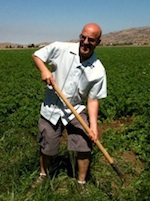 Martin Anenberg, founder of So Cal Farm Network, started buying and selling locally grown produce in 2004. His first customer was a school district in Los Angeles County that ordered once a week for many of its elementary school’s salad bars.
Martin Anenberg, founder of So Cal Farm Network, started buying and selling locally grown produce in 2004. His first customer was a school district in Los Angeles County that ordered once a week for many of its elementary school’s salad bars.
After growing his business to include restaurants and institutions, Martin joined forces with one of the major produce distributors in downtown Los Angeles. It was this experience where he gained first hand knowledge of how large scale agriculture and distribution worked.
Martin’s mission is to develop a local produce supply chain that resembles the efficiency and positive aspects of mainstream agricultural distribution. By creating a one stop solution for wholesalers, restaurants, institutions, and CSA’s , businesses can focus on what they do best and easily purchase source-verified farm products.
Martin’s past work experiences include Entrepreneur-in-Residence for the University of Massachusetts, Locally Grown Manager for Worldwide Produce, and Business Development Manager for Freshpoint of Southern California. Martin currently serves as a member of the Los Angeles Food Policy Council and as a member of the Los Angeles Regional Food Hub Group, which is headed by the Center of Food and Justice at Occidental College. Martin’s work has been featured on PBS’s former series “Life and Times.”
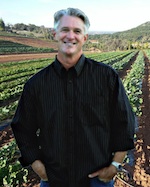 Don Webber, Partner, Cultivating Good, Inc. brings more than 20 years experience in both corporate and non-profit management, leadership and governance to the Cultivating Good team. He has applied his entrepreneurialism to start-up, local and national companies and non-profit organizations. Don is currently a Board Member of Slow Food Temecula Valley.
Don Webber, Partner, Cultivating Good, Inc. brings more than 20 years experience in both corporate and non-profit management, leadership and governance to the Cultivating Good team. He has applied his entrepreneurialism to start-up, local and national companies and non-profit organizations. Don is currently a Board Member of Slow Food Temecula Valley.
After creating Harvest 2U, a successful third party CSA (Community Supported Agriculture) delivering locally grown organic produce in Riverside and San Diego Counties, Don joined forces with E.A.T Marketplace to form Cultivating Good. The purpose of Cultivating Good is to promote awareness, foster education, improve health and create jobs in our communities through a focus on sustainable agriculture and the craft-food industry. Cultivating Good brings an entrepreneurial approach to managing and distributing good, clean, local food literally from the ground to the plate.
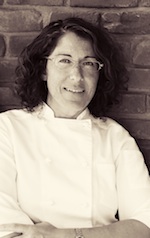 Leah Di Bernardo is the award-winning Chef of E.A.T Extraordinary Artisan Table, a locally grown Eatery in the Temecula Valley. Dedicated to providing farm foraged, hand crafted fair, since 2002. E.A.T’s business-mission statement champions purchasing local and supporting your neighbors, as this stimulates the region’s economy and creates conviviality, loyalty & community.
Leah Di Bernardo is the award-winning Chef of E.A.T Extraordinary Artisan Table, a locally grown Eatery in the Temecula Valley. Dedicated to providing farm foraged, hand crafted fair, since 2002. E.A.T’s business-mission statement champions purchasing local and supporting your neighbors, as this stimulates the region’s economy and creates conviviality, loyalty & community.
Di Bernardo learned how important small farmers were at a young age while helping her dad on their Oregon farm. It was at this time that she truly fell in love with the art of scratch cooking and the idea that creating a wholesome meal does more than just feed the body – it feeds the soul. After more than 10 years as an accomplished producer in the film and television industry, Leah wanted to pass along these core values to her own daughter, Gabrielle Rose, who’s now 11 years old, and a food advocate in her own right!
So with her sass, her creativity, her ever-present warmth and compassion, Leah now produces great food and phenomenal events- all this while championing, and fighting for small farmers rights and Artisan food producers growth! The Slow Food Movement is at the heart of everything Leah does. She is passionate about the world community of farmers as well as the local food movement and strives to keep traditions and family food heritage alive within all of this. “The food we eat affects how we think, feel and treat others. So eat good, clean food,” she regularly tells customers, family, and friends.
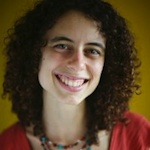 Jenna Smith is the Executive Director of Central Coast Grown, a non-profit organization that works to develop a sustainable regional food system in San Luis Obispo County. Over the last several years she has collaborated directly with the City of San Luis Obispo to bring a 20-acre, multi-enterprise educational farm into production. Currently she serves as the Chair for the San Luis Obispo County Food Systems Coalition and sits on the state-wide California Food Policy Council. Jenna holds a dual M.A. in Natural Resources and Sustainable Development from American University (Washington, D.C.) and the United Nations-Mandated University for Peace (Costa Rica).
Jenna Smith is the Executive Director of Central Coast Grown, a non-profit organization that works to develop a sustainable regional food system in San Luis Obispo County. Over the last several years she has collaborated directly with the City of San Luis Obispo to bring a 20-acre, multi-enterprise educational farm into production. Currently she serves as the Chair for the San Luis Obispo County Food Systems Coalition and sits on the state-wide California Food Policy Council. Jenna holds a dual M.A. in Natural Resources and Sustainable Development from American University (Washington, D.C.) and the United Nations-Mandated University for Peace (Costa Rica).
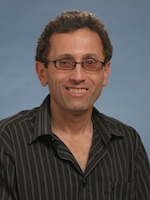 Milt McGiffen is UCR’s Extension Vegetable Specialist and Vice Chair for Extension. He grew up in the rolling farmland and forests of rural western Pennsylvania, earning his BS from Penn State and MS from NCSU. After graduating with his PhD from the University of Illinois, Milt worked as a Research Agronomist for the North Central Soil Conservation Laboratory before beginning his 22 years at UCR. He conducts applied research on crop production, weed management, organic agriculture, and the ecosystem services provided by agriculture. His extension program covers the full range of crop production issues, including training Master Gardener’s and pest control advisors. He has worked in Ukraine, Vietnam, Saudi Arabia, China, and several other countries as part of USAID and other programs for small farmers. Dr. McGiffen is particularly interested in bringing together urban dwellers and farmers to sustain agriculture, provide healthy local food, and maintain the environment.
Milt McGiffen is UCR’s Extension Vegetable Specialist and Vice Chair for Extension. He grew up in the rolling farmland and forests of rural western Pennsylvania, earning his BS from Penn State and MS from NCSU. After graduating with his PhD from the University of Illinois, Milt worked as a Research Agronomist for the North Central Soil Conservation Laboratory before beginning his 22 years at UCR. He conducts applied research on crop production, weed management, organic agriculture, and the ecosystem services provided by agriculture. His extension program covers the full range of crop production issues, including training Master Gardener’s and pest control advisors. He has worked in Ukraine, Vietnam, Saudi Arabia, China, and several other countries as part of USAID and other programs for small farmers. Dr. McGiffen is particularly interested in bringing together urban dwellers and farmers to sustain agriculture, provide healthy local food, and maintain the environment.
Erika Block is the Founder and CEO of Local Orbit, which provides sales and business management tools for the entrepreneurs & organizations building the New Food Economy. Local Orbit helps build profitable businesses and healthier communities.
Prior to Local Orbit, Erika founded and ran an entrepreneurial arts organization, producing cross-sector partnerships in the US, Great Britain and South Africa. She also led the renovation of a vacant building in Detroit into a theater, gallery and bar where she worked with vendors to source local food for events. Throughout her career, Erika has created collaborative environments that facilitate learning and action. She has an MFA from Columbia University, and did graduate work in Interactive Technology at NYU. Erika comes from a family of fruit peddlers, meat processors, restaurant owners and wholesalers. She is a PopTech Social Innovation Fellow. Other awards include Crain’s Detroit Business 40 Under 40.
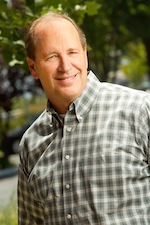 Curt Covington is a Managing Director and Area Manager for the Agribusiness Banking Division at San Francisco-based Bank of the West. Bank of the West ranks as the 3rd largest agricultural lender among commercial banks in the United States.
Curt Covington is a Managing Director and Area Manager for the Agribusiness Banking Division at San Francisco-based Bank of the West. Bank of the West ranks as the 3rd largest agricultural lender among commercial banks in the United States.
With 34 years of agricultural banking experience, Curt is responsible for managing the growth and performance of the bank’s $1.5 billion regional agricultural loan portfolio.
Prior to joining Bank of the West in 2006, Curt spent a good part of his early banking career in the Farm Credit system followed by a period as a credit administrator with Rabobank. He is the past chairman of the American Bankers Association Ag and Rural Bankers Committee in Washington DC and is the present chairman of the RMA Agricultural Bankers Committee. Curt serves as co-chair and manages two agricultural Lender programs: The Agricultural Lending Institute, a joint venture with California State University, Fresno, and, The Agricultural Banking Institute of the Americas, a joint venture with Universidad del Pacifico, in Peru.
Daniel Allen is the CEO of Farmscape, an urban farming venture based in Los Angeles that has setup more than 350 gardens at homes, schools and restaurants and maintains 125 on a weekly basis. Dan is a Master Gardener and a member of the LA Food Policy Council’s Working Group on Urban Agriculture. He is also a periodic contributor to The Huffington Post and Seedstock.
Register now to receive the Seed Saver Discount rate at: http://growriverside.eventbrite.com
Speakers at Seedstock’s “Grow Riverside” Conference to Examine Opportunities for Urban and Local Ag
December 3, 2013 | Robert PuroRiverside, CA – How can cities leverage unused agricultural land to increase the supply of locally available and create new jobs and farmers? What small scale urban agriculture solutions are bearing fruit? Is it possible to create an economically viable farming business on one or two acres of land? How can the USDA help? What are innovators in the sustainable urban agriculture space doing? What policy needs to be put into place to facilitate an active agricultural economy in a city and on its fringes?
These and other questions will be the focus of Seedstock’s upcoming Grow Riverside: Citrus and Beyond! conference, which is set to take place on March 19 – 20 at the Riverside Convention Center in Riverside, CA. The event will feature urban agriculture innovators, key policy makers, nutrition experts, and investors, who will partake in a two-day, outcomes-based conference to examine solutions to help cities, Riverside in this particular case, to galvanize their citizens, growers, advocates, government officials and other major stakeholders around the economic opportunities that can result from employing sustainable urban agriculture.
Some of the innovators and noteworthy presenters who will address these issues include:
 Pierre Sleiman is a young entrepreneur who has become involved in the mission of accelerating the movement towards local and sustainable farming and fostering interest in youth to choose agriculture as an exciting career. Pierre is the founder and CEO of Go Green Agriculture, a local farming business that grows local, high-quality leafy greens. He has been named as one of the “50 People to Watch in 2013” by San Diego Magazine and has been featured in over two-dozen other publications and live news broadcasts. He holds a Masters degree in Business from UC San Diego and a double Computer Science/Business bachelor’s degree from UC Riverside. Pierre was also recently elected to the Board of Directors of the San Diego Farm Bureau. Read More
Pierre Sleiman is a young entrepreneur who has become involved in the mission of accelerating the movement towards local and sustainable farming and fostering interest in youth to choose agriculture as an exciting career. Pierre is the founder and CEO of Go Green Agriculture, a local farming business that grows local, high-quality leafy greens. He has been named as one of the “50 People to Watch in 2013” by San Diego Magazine and has been featured in over two-dozen other publications and live news broadcasts. He holds a Masters degree in Business from UC San Diego and a double Computer Science/Business bachelor’s degree from UC Riverside. Pierre was also recently elected to the Board of Directors of the San Diego Farm Bureau. Read More
“Grow Riverside” Conference to Examine Economic, Community Benefits of Local Sustainable Agriculture
November 21, 2013 | seedstockNews Release: Riverside, CA – November 21, 2013 – Grow Riverside: Citrus and Beyond!, slated for Wednesday and Thursday, March 19-20, 2014, will reconnect the City of Riverside to its agricultural roots as well as provide a template for other cities interested in identifying the economic and community advantages of local sustainable farming.
The objectives of the conference, to be held at the Riverside Convention Center, will define opportunities for food production within Riverside’s environs, explore solutions to sustainably increase local food in an economically viable manner, and develop practical next steps to leverage the area’s rich agricultural assets.
“One of society’s burgeoning challenges is the need to establish local, sustainable food sources,” said Seedstock co-founder and Grow Riverside event organizer, Robert Puro. “The conference seeks to foster innovation and entrepreneurship in sustainable agriculture by uniting citizens, growers, advocates, government officials, and other major stakeholders to forge new partnerships and, ultimately, develop creative solutions to building and expanding local urban agriculture.”
Keynote addresses and panel discussions will afford conference attendees the opportunity to explore a variety of topics, including: Building a Local Agriculture Future; Developing Economically Viable Small-scale Farming Solutions; Health and Community Benefits of Local Food; Funding the Future of Farming; Citrus and Beyond; The Local Food Landscape; Urban Farming; and, Forming a Local Food Alliance.
“Our conference, although designed with the city of Riverside in mind, can be a model for any and all cities looking to enhance local agriculture and assist growers and farmers in their success,” said Councilmember Chris MacArthur, who represents Riverside’s historic greenbelt area. “We encourage farmers, entrepreneurs, food service businesses, city planners and all other interested parties to join us and share their innovative ideas at the conference.”
To purchase early bird tickets, please visit http://growriverside.eventbrite.com.
About Seedstock
Seedstock is a social venture focused on innovation and sustainability in agriculture. Through the use of a variety of tools, including the news and information blog Seedstock (http://www.Seedstock.com) and live events, the company promotes agricultural startup companies, university research, urban agriculture initiatives, and farmers employing innovative new techniques and approaches.
About the City of Riverside
The City of Riverside made the navel orange a symbol of bounty and a household staple in California, and today the City maintains more than 1,000 acres of citrus groves. As Riverside continues to grow, so does local pride for the City’s rich agricultural history and consumer demand for healthful local foods. A full 11 percent of the total acreage of the city is designated for agricultural use, unparalleled for a Southern California city of its size. Riverside’s growers, local government officials, and residents are eager to be at the forefront of innovation as a city devoted to sustainable local agriculture.

